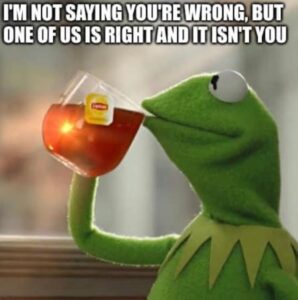 There’s something that often happens when we’re in conflict – our interpersonal disputes often seem to end up being about right and wrong! And by being right we seem to need to make the other person wrong. The conflict might not have started in a way that results in views that are disparate and not mutually acceptable. But, somehow as things escalate the dynamic can become increasingly polarized. Each of us asserts our perspectives in ways that become stronger and stronger and a potentially healthy conflict ends up only about right and wrong.
There’s something that often happens when we’re in conflict – our interpersonal disputes often seem to end up being about right and wrong! And by being right we seem to need to make the other person wrong. The conflict might not have started in a way that results in views that are disparate and not mutually acceptable. But, somehow as things escalate the dynamic can become increasingly polarized. Each of us asserts our perspectives in ways that become stronger and stronger and a potentially healthy conflict ends up only about right and wrong.
There are lots of reasons for this, including that the outcome wanted is deeply held. Other reasons might include hearing what the other person is saying inflames us more and more especially as emotions escalate; we have a need to be right no matter what; maybe, it’s a need to be in control; shortsightedness, feeling disrespected and/or not being heard; we may be competitive by nature; we want to retaliate; our ego stands in the way; we are blocked from considering ways to collaborate; we feel shame about backing down; we lack respect for the other person and/or their viewpoints; and so on. These possibilities work both ways of course – whatever ways we might become embroiled so does the other person for such reasons and others.
This week’s Conflict Quest(ions) blog invites you to consider a situation in which a dispute has evolved and you are strongly holding on to being right.
- What’s the dispute about?
- About what do the two of you most disagree?
- In what ways do think you are right? What makes your view right?
- What is (are) the other person’s perspective(s) – with which you disagree? What makes their perspective(s) wrong?
- What do you think is important to the other person that they are strongly asserting the rightness of their viewpoint(s) referred to above?
- Which of their viewpoints might you consider acceptable?
- What is understandable about those (above), at least to some degree?
- On what might the two of you come to agree in this dispute?
- If both of you remain steadfast in your perspectives then what?
- What might you give up asserting, if anything, without regrets?
- What else occurs to you as you consider these questions?
- What insights do you have?
#interpersonalconflict
#conflict
#coaching
#conflictcoaching
#conflictmanagementcoaching
#conflictmanagement
#disputeresolution



 It’s not the first time this blog has written about a common reaction to being in conflict – looking behind us at what happened or didn’t happen, wishing we had said or done something differently, continually blaming ourselves or the other person for things we cannot take back and so on. There are so many reasons for this.
It’s not the first time this blog has written about a common reaction to being in conflict – looking behind us at what happened or didn’t happen, wishing we had said or done something differently, continually blaming ourselves or the other person for things we cannot take back and so on. There are so many reasons for this.